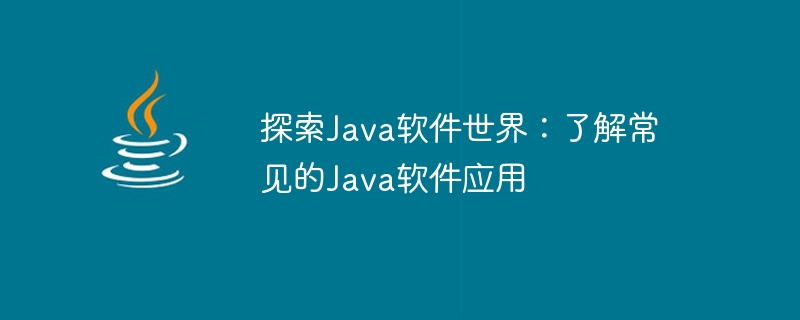

Exploring the world of Java software: To understand common Java software applications, specific code examples are required
Introduction:
Java is widely used as a software Developed programming language with rich functionality and strong cross-platform features. In the world of Java software, there are many common applications that we can utilize and learn from. In this article, we will explore some common Java software applications and provide specific code examples to help readers better understand and master these applications.
1. Graphical User Interface (GUI) Application
GUI application is one of the most common applications in Java software development. Java provides powerful graphics libraries that developers can use to create a variety of user interfaces. The following is a sample code for a simple Java GUI application:
import javax.swing.*; public class SimpleGUI extends JFrame { public SimpleGUI() { super("Simple GUI"); setDefaultCloseOperation(JFrame.EXIT_ON_CLOSE); setSize(320, 240); setLocationRelativeTo(null); setVisible(true); } public static void main(String[] args) { SwingUtilities.invokeLater(() -> new SimpleGUI()); } }
In this example, we create a window named "Simple GUI" and set the size and position of the window. By calling thesetVisible(true)method, we display the window on the screen. In themainmethod, we use theSwingUtilities.invokeLatermethod to start the window creation and display process.
2. Network Applications
Java is also a programming language that is very suitable for developing network applications. Using Java's network library, developers can easily create various network applications, such as web servers, clients, and chat applications. The following is a sample code for a simple Java network application:
import java.io.*; import java.net.*; public class SimpleServer { public static void main(String[] args) { try (ServerSocket serverSocket = new ServerSocket(8080)) { System.out.println("Server started on port 8080"); while (true) { Socket socket = serverSocket.accept(); System.out.println("Accepted connection from " + socket.getInetAddress()); new Thread(() -> handleRequest(socket)).start(); } } catch (IOException e) { e.printStackTrace(); } } private static void handleRequest(Socket socket) { try (BufferedReader reader = new BufferedReader(new InputStreamReader(socket.getInputStream())); BufferedWriter writer = new BufferedWriter(new OutputStreamWriter(socket.getOutputStream()))) { String request = reader.readLine(); System.out.println("Received request: " + request); String response = "Hello, client!"; writer.write(response); writer.newLine(); writer.flush(); } catch (IOException e) { e.printStackTrace(); } } }
In this example, we create a simple server application that listens to port 8080 and returns a simple response when receiving a client request. When a new connection comes in, we create a new thread to handle the request in order to handle multiple client requests at the same time. Through the IO stream, we can read the request sent by the client and send the response to the client.
3. Database Application
Java also has rich support for database applications. Developers can use the JDBC library provided by Java to access various relational databases, such as MySQL, Oracle, and PostgreSQL. The following is a sample code for a simple Java database application:
import java.sql.*; public class SimpleDatabaseApp { public static void main(String[] args) { try (Connection conn = DriverManager.getConnection("jdbc:mysql://localhost/mydatabase", "username", "password"); Statement stmt = conn.createStatement()) { System.out.println("Connected to database"); String sql = "SELECT * FROM users"; ResultSet rs = stmt.executeQuery(sql); while (rs.next()) { String name = rs.getString("name"); int age = rs.getInt("age"); System.out.println("Name: " + name + ", Age: " + age); } } catch (SQLException e) { e.printStackTrace(); } } }
In this example, we connect to a MySQL database named "mydatabase" and query a table named "users". By executing the SQL statement and iterating through the result set, we print out each row of data in the table.
Conclusion:
Java is a very powerful and versatile programming language that is widely used in software development. This article introduces common application types in Java software development, including graphical user interfaces, network and database applications, and gives corresponding code examples. By understanding and studying these examples, readers can better master the basic knowledge and skills of Java software development and further expand their application capabilities in the Java software world. I hope readers can continue to improve their Java programming abilities through continued learning and practice, and make more contributions to the world of software development.
The above is the detailed content of Perspective on the Java Software Land: Get Familiar with Common Java Applications. For more information, please follow other related articles on the PHP Chinese website!
 How to buy and sell Bitcoin? Bitcoin Trading Tutorial
How to buy and sell Bitcoin? Bitcoin Trading Tutorial Introduction to the use of vscode
Introduction to the use of vscode What does apache mean?
What does apache mean? Why is my phone not turned off but when someone calls me it prompts me to turn it off?
Why is my phone not turned off but when someone calls me it prompts me to turn it off? insert into select
insert into select html file opens blank
html file opens blank How to open mobi file
How to open mobi file How to solve the 0x0000006b blue screen
How to solve the 0x0000006b blue screen



